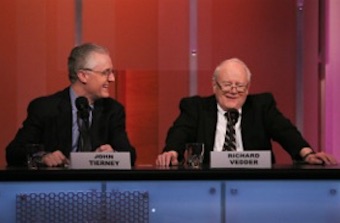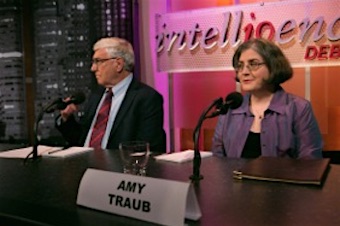Pro-Walmart forces convinced 48% of a 300+ studio audience to vote in favor of “Long Live Walmart” but 44% of the online audience voted against the proposition while 40% voted in favor of it. The initial vote of those in attendance, before the debate at the Kaufman Center, 129 W. 67th st., was 30% in favor of Walmart.
|
|
|
photos: Samuel Lahoz Photography |
The percentage of online voters who were against the proposition grew from 36% pre-vote to 44% after the debate while those in favor of the proposition grew from 24% to 40%. The undecideds shrank from 40% to 16%.
Defending Walmart were Richard Vedder, author of The Wal-Mart Revolution, and John Tierney, former New York Times columnist. Critics were Nelson Lichtenstein, author of The Retail Revolution: How Walmart Created a Brave New World of Business, and Amy Traub, researcher for Demos, liberal-oriented policy organization.
Traub explores consumer debt, job creation and the U.S. middle class for Demos, founded in 2001 and which had revenues of $7.42M in 2015.
The event was streamed online, and viewers were able to cast their votes on the proposition, “Long Live Walmart.” Hosting the event was Intelligence Squared U.S.
Walmart is an Edelman account. Moderator was John Donvan, co-author of In a Different Key: The Story of Autism. He is also a regular correspondent for “Nightline.”
Tierney: Walmart Deserves Nobel Prize
Tierney, a contributing editor to the quarterly publication City Journal and contributing science columnist for the New York Times, said Walmart’s contributions are so great that it deserves “a Nobel prize.” Walmart revenues are $485 billion, and it employs 2.3 million.
|
|
Besides saving U.S. consumers money, it is a major player in the reduction of global poverty, serving as a “pipeline for redistributing wealth from rich countries to poor countries,” he said.
The motivation for attacks against the company, he claimed, have much of their roots in “snobbery,” a sense that the store’s offerings are “tacky.” Also contributing to Walmart’s negative public image, he added, is the opposition it faces from two major opponents: newspapers and labor unions.
Traub talked about the difficulties faced by its employees. Addressing issues of low pay and what she called the refusal of Walmart to bring many part-time employees up to full-time status, she said that the company has created a “low-wage business model” that is a major contributor to the problems now faced by the American economy at large.
She also referred to what she called the ever-increasing share of company profits that go to the Walton family, the company’s main shareholders, and held that up as a commentary on the problem of economic inequality in the U.S. Traub highlighted chains such as Costco and Trader Joe’s as examples of how retail chains can provide better working conditions.
Walmart a “Private Anti-Poverty Program”
Vedder called Walmart “a private anti-poverty program that actually benefits taxpayers.” He said that its downward pressure on consumer prices is a boon to lower-income Americans, claiming that Walmart sells its goods at prices that are from eight percent to 39 percent less than its competitors.
Consumers “voted with their feet” when they abandoned smaller stores for the big-box chain. He also noted the difficulties that Walmart faces in the current economic climate, when internet commerce, specifically the overwhelming presence of Amazon, is cutting into the company’s profits and necessitating major investments in bolstering its online profile.
He discounted the example of Costco as offering an alternative to Walmart’s current policies, noting the different consumer audience at which each chain is targeted. “Costco is the biggest seller of champagne in America,” he quipped, “and people who shop at Walmart don’t drink champagne.”
Lichtenstein focused on what he saw as the poor working conditions faced by Walmart employees. He accused the company of indulging in what he called “churn,” the rapid turnover of lower-level employees that, in his opinion, made it difficult for any worker to pursue a long-term career at the company. He also questioned the claim that Walmart benefits lower-income consumers, claiming that in urban areas the chain tends to avoid locating in poorer neighborhoods.
Audience Questioned Panel
After each of the panelists made their presentation, they faced a series of questions from Donvan, and then the floor was opened to the audience. Noting the huge amount of applicants (23,000) for 600 available Walmart job slots in Washington, D.C., one audience member asked if perhaps potential employees felt there was a greater sense of opportunity with the chain.
Another brought what she saw as the company’s positive environmental record to light, while others addressed the store’s allegedly detrimental effect on “quality-of-life” issues and the factor the chain plays in the shuttering of small stores.
So, in spite of living in one of the nation’s few Walmart-free zones, a New York audience proved itself to be surprisingly open to having its opinion of the chain, and its image changed.
Vedder, Tierney and others say new Walmart stores boost employment and income in communities, especially benefitting the poor; that Walmart employees are paid fairly, and that very few do not have health insurance. They decry attempts by communities to penalize Walmart by enacting restrictive zoning laws, requiring health insurance or setting high minimum wages.
10,000 New Jobs Promised
Walmart in January said it would create 10,000 new jobs in the U.S. this year.
Supporters say this is the latest example of Walmart benefitting America by providing jobs to low-skilled workers, selling affordable goods, and attracting new consumers and businesses to its neighborhoods.
Lichtenstein, Traub and other critics say Walmart hurts local communities by pushing out locally-owned businesses, provide low pay and “restrictive” work hours, and force U.S. companies to use cheap foreign labor.
While widely diverging opinions on Walmart were voiced by the panelists, a quick poll of them revealed that all had at one point shopped at the big-box retailer. A similar poll of the audience revealed that 46 percent of them had shopped at Walmart in the past year, while 54 percent said they had not.
Walmart has “spread evangelical Protestantism into the workplace, made South China an American workshop, and pushed U.S. politics to the right,” says Lichtenstein.

 John Tierney (L) & Richard Vedder
John Tierney (L) & Richard Vedder Nelson Lichtenstein (L) & Amy Traub
Nelson Lichtenstein (L) & Amy Traub
 Husch Blackwell Strategies has added FleishmanHillard alum Michael Slatin as a principal in its public affairs group.
Husch Blackwell Strategies has added FleishmanHillard alum Michael Slatin as a principal in its public affairs group. Rory Cooper, a veteran Republican operative and policy specialist, has joined Teneo’s Washington office as senior managing director in its strategy & communications practice.
Rory Cooper, a veteran Republican operative and policy specialist, has joined Teneo’s Washington office as senior managing director in its strategy & communications practice. Brian Fallon, who served as national press secretary for Hillary Clinton’s 2016 presidential run, is signing on next month as Vice President’s Kamala Harris’ campaign communications director.
Brian Fallon, who served as national press secretary for Hillary Clinton’s 2016 presidential run, is signing on next month as Vice President’s Kamala Harris’ campaign communications director. TikTok is nothing more than a Chinese propaganda tool that poses “a grave threat to America’s national security and, in particular, impressionable children and young adults,” say two Congressmen who want the platform registered as a foreign agent.
TikTok is nothing more than a Chinese propaganda tool that poses “a grave threat to America’s national security and, in particular, impressionable children and young adults,” say two Congressmen who want the platform registered as a foreign agent. Public Strategies Washington has added Abbie Sorrendino, a former aide to now Senate Majority Leader Chuck Schumer.
Public Strategies Washington has added Abbie Sorrendino, a former aide to now Senate Majority Leader Chuck Schumer.


 Have a comment? Send it to
Have a comment? Send it to 
No comments have been submitted for this story yet.